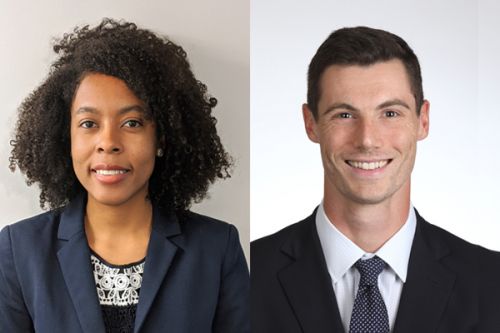At Dartmouth, we are committed to providing equal opportunities to all students.
Accommodations are determined on an individual basis through an interactive process that includes the student and Tuck. Our accommodation process is based on federal law and Dartmouth guidelines. Students may request an accommodation at any time. Please note that it may take up to 2-3 weeks to complete the accommodation request process.
The process is coordinated by the Dartmouth ADA Office in collaboration with Tuck Associate Dean Sally Jaeger.
We aim to make the accommodation request process straightforward and accessible for all students. If you have any questions regarding this process, the Dartmouth ADA Office is available to assist you. You can contact the ADA Office at ADA@dartmouth.edu.
Accommodation Request Process:
- Submit an Accommodation Request Form via http://dartgo.org/grad-arf, which includes the ability to attach supporting third-party documentation. Review Documentation Guidelines.
- The ADA Office will contact the student to schedule a meeting with the student and discuss their accommodation request in greater detail.
- The ADA Office will review the information submitted during the meeting and with the accommodation request form, including self-report and documentation. The ADA Office will also gather any relevant information from Tuck necessary to fully evaluate the accommodation request. The ADA Office will follow up with the student if any additional information is necessary.
- An accommodation decision will be made and communicated to the student and Tuck Associate Dean Sally Jaeger. When an accommodation is put into place, clear instructions for implementation and support will be provided to the student.
- The ADA Office remains a resource after the accommodation process is complete. Students may ask for new or different accommodations at any time, and students should contact the ADA Office immediately if they have any trouble using their accommodations. This includes any challenges related to how the accommodations are implemented or fit into your classes, and any issues or resistance with faculty and staff.
It is the student's responsibility to make their needs known and provide the appropriate documentation to support the need for requested accommodations. Students may request new or different accommodations at any time. We encourage students to immediately contact the Dartmouth ADA Office and Tuck Associate Dean Sally Jaeger if they have any questions or concerns.
Confidentiality Policy Statement and Opt-Out Instructions
The Family Educational Rights and Privacy Act (FERPA) protects you, and academic information about you, from being disclosed to unauthorized parties without your consent. We are allowed to disclose what is defined as “Directory Information,” although we exercise great caution before releasing this information. At the Tuck School, directory information is defined as your name, age and date of birth, student ID number, dates of attendance, enrollment status, class year, degree(s) sought, degree(s) receipt or non-receipt, degree(s) awarded date(s), major, awards and honors earned, address and telephone number, school email address, place of birth, previous educational institutions attended and degrees awarded, participation in extracurricular activities, your student photo, your hometown, places and lengths of employment, a student-employee’s employing Dartmouth business unit, and whether or not you have permanent work authorization in the United States.
Information about students is shared as part of Tuck’s daily operations. De-identified data may also be used by Tuck faculty for research. An enrolled student may refuse to permit the release of any information, including “directory information,” about them. This must be done annually, via email, to the Tuck Registrar. The student who has made such a request is responsible also for submitting a written request that this restriction be removed.
To request a confidentiality flag for your record, send an email to the Tuck Registrar.
What this means:
- Your name will not appear on public (external) lists of Tuck students; your status as a student enrolled at Tuck will not be acknowledged outside of the school.
- Your name and picture will be included in TuckConnect, as access to these sites requires authentication for Tuck students, faculty, and staff. Your current address and other biographical information will not appear.
Family Educational Rights and Privacy Act (FERPA)
View Dartmouth College’s Family Educational Rights and Privacy Act.
Photography and Video Recording and Usage Policy
The Tuck School of Business at Dartmouth and its representatives take photographs, film, and video for the school’s use in print and electronic publications. As a condition of enrollment, you agree that Tuck may use, reproduce, and publish images in which you may be included taken in the offices, academic and common areas of Dartmouth College (including the Tuck School) for editorial, promotional, or other institutional purposes, and that you are not entitled to compensation for such use. You release the school and the photographer from all claims and liability related to said photographs.
Tuck considers student headshots to be directory information. See Confidentiality Policy Statement and Opt-Out Instructions for additional information.
As part of its daily operations, Tuck reserves the right to photograph and/or record students, faculty, staff, and guests while on school property or during school-sponsored functions in places and situations where individuals do not have a reasonable expectation of privacy. These images and audio may be used by the school for promotional purposes, including use in newspapers, school publications, videos, school websites, social media channels, and other materials, and will be archived at the Tuck School of Business.
Anyone wishing not to participate in photo or video shoots in which they may be featured individually or as part of a small group may proceed in one of two ways:
- Inform the photographer/videographer at the time of the event.
- Submit a formal request to the Tuck Registrar to opt-out of the blanket policy described above. Tuck works with a variety of photographers and will share the student’s headshot with photographers/videographers prior to events at which the student may be present.
Generally, and to the extent practicable, requests from students and other community members not to be photographed or to be recorded in video, even in public spaces, are respected.
For information regarding digital photo requirements for student photos, please visit Student Photo Requirements.

